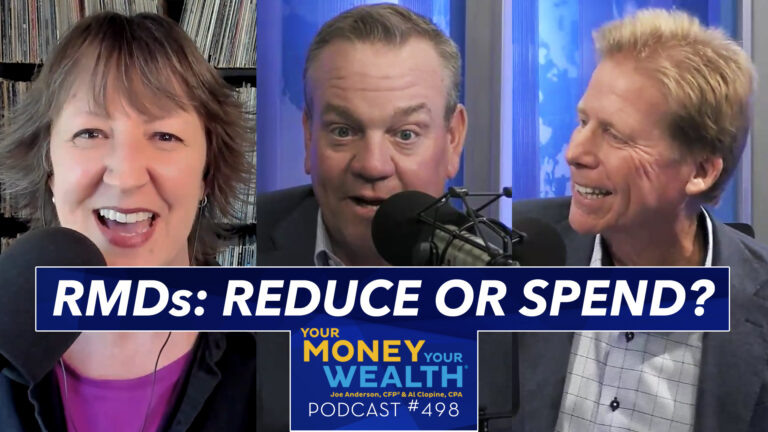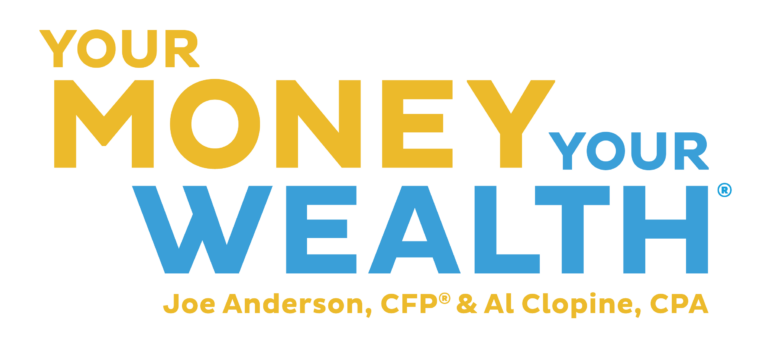Spitballing a real estate strategy: sell investment rental properties to buy a home, use restricted stock units (RSU), do a 1031 exchange, or some other idea? Plus, is it worth it to hire a financial advisor? Is it a good idea to do Roth IRA conversions to the top of your tax bracket each year? How can you move non-deductible IRA money to Roth IRA without paying taxes again? And a cautionary tale about Roth conversions and stimulus payments.
Subscribe to the YMYW podcast Subscribe to the YMYW newsletter

Show Notes
- (00:57) Should We Sell Our Investment Properties to Buy a Home? (Connie, Bay Area)
- (11:27) Is Hiring a Financial Advisor Worth the Money?
- (21:32) Is Doing Annual Roth Conversions to the Top of My Tax Bracket a Good Idea? (Uncle Bilbo)
- (23:20) How Can I Move Non-Deductible IRA Money to Roth Without Paying Tax Again? (Priya, Irvine, CA)
- (26:11) Avoiding Costly Tax Filing Mistakes: Roth Conversions Make You Ineligible for Stimulus Payments (Daniel & Tracey)
Free resources:
READ | BLOG: Real Estate Investing 101
WATCH | VIDEO: How Do You Start Investing in Real Estate? 3 Tips for Beginning Real Estate Investors
WATCH | VIDEO: Can I Buy Real Estate in an IRA?
LISTEN | YMYW PODCAST #52: What You Need to Know Before Choosing a Financial Advisor
LISTEN | YMYW PODCAST #103: Do You Really Need a Financial Advisor?
LISTEN | YMYW PODCAST #254: Is It Time to Fire Your Financial Advisor?
Listen to today’s podcast episode on YouTube:
Transcription
Today on Your Money, Your Wealth® podcast 323, Joe and Big Al spitball a real estate strategy for Connie and her husband, who own a couple investment properties and want to buy themselves a home. Should they sell one or both rental properties? Use the restricted stock units or RSUs Connie’s husband will be getting from his employer? Also, John in Salem, Massachusetts writes in to YMYW to ask a CERTIFIED FINANCIAL PLANNER™ and a Certified Public Accountant if it’s worth it to hire a financial advisor. And finally, of course, Roth conversions: should Frodo’s uncle convert to the top of his tax bracket each year? How can Priya in Irvine move non-deductible IRA money to Roth without paying taxes again? And Daniel and Tracey share their cautionary tale about Roth conversions and stimulus payments. I’m producer Andi Last, and here are the hosts of Your Money, Your Wealth®, Joe Anderson, CFP® and Big Al Clopine, CPA.
Should We Sell Our Investment Properties to Buy a Home?
Joe: “Hi Joe, Al and Andi. Al said he likes to talk about real estate, so I’m interested in your spitballing on this. Background, I’m 47, husband 45, two kids in the Bay Area, one cat named Pepper. I drive a 2012 Toyota Rav4; husband, 2013 Nissan Leaf. I listen to you when I’m walking or running in the neighborhood. We own a house in the East Bay. We owe $180,000; bought it for $650,000 at 4.5%; currently rent it, below market at $2800 per month; property taxes, $1300; Zillow estimate’s worth over $1,000,000. We own another house in Bellevue, Washington, bought it at $375- $375,000; owe $70,000 on that; rent it for $2700 a month; property taxes, $9000; Zillow estimate about $900,000. Both houses pay for themselves and we clear $30,000 before any repairs, et cetera, et cetera.” Let’s see- “That et cetera, et cetera can get dollars when trees start falling in one backyard. Ask me how I know.”
Andi: The joys of being a homeowner.
Joe: “We’re currently renting in another part of the Bay Area, $5500 a month, which is likely to go up next year. We’ve been saving to buy in this extraordinarily high real estate market and have saved $400,000 that is sitting in cash. Townhouses and houses in our kids’ school district start around $2,000,000.” Oh wow.
Al: That is a high rent district.
Joe: Yes, sir. “Other info that might be helpful: The company my husband started working for last year, just IPO’d a couple of weeks ago. November we’d be able to cash out of RSUs and will likely be worth around $1,500,000 at current stock price. He makes $400,000 plus RSUs a year; total comp is $1,200,000.” She found a good one. Connie, $1,200,000, comp. It’s pretty good.
Al: Yeah.
Joe: But it’s probably- it feels like maybe $200,000 because $2,000,000 for townhouse. Geez. We got some questions, Big Al, you ready for these?
Al: Ok, let’s do it.
Joe: “Should we keep these rental houses? I admit I still have some emotional attachment to the Bellevue house, but the only reason we have the Berkeley house is that we’ve toyed around with trying to take advantage of Prop 19 at some time in the future. Moving back in a couple of years and then moving again to take the property taxes with us. What are your thoughts on that? Or sell one or both of them and use the profits towards a home here? Or sell one and invest it and use the RSUs and savings toward a home here?” What do you think, should they keep the property? Sell them to buy a place in the Bay Area?
Al: OK, well, let’s start with cash flow. So the Bellevue House is worth $1,100,000 and has a mortgage of- we’ll call it $200,000. So it’s got about $900,000 of equity. And the home in the Bay Area is- what’s that one worth- $900,000- and what’s the debt on that one?
Joe: No, that’s Bellevue-
Al: Oh, that is Bellevue.
Joe: Mmm, $900,000. They owe $70,000. So call it $800,000 of equity and they get $2700 a month. Oh, that’s the Bellevue. I got the- the Bay Area is the first one, so that’s $900,000. The other one is- which is-
Joe: $1,100,000.
Al: $1,100,000 with a $200,000 debt. So $900,000 equity and the Bellevue one they owe $70,000 so we’ll call it $800,000 of equity. So that’s $1,700,000 of equity. They got- they’re clearing about $29,000, I think she said. Right?
Joe: $2700 a month call it.
Al: I’m saying $29,000 is what they’re clearing.
Joe: Oh, yeah, ‘we cleared $30,000-‘
Al: – before house repairs.
Joe: Mmmm.
Al: So we won’t even worry about house repairs at this point. $29,000 compared to $1,700,000 of equity. Your cash on cash is 1.7%. That’s pretty low. So they’re not great cash flow, which is not surprising. California properties are generally not great cash flow. You’d like to find something, even in California, like to find something that once it’s paid off, it’s got about a 3% cash flow. Bellevue I know less about. So I would tell you right off the bat, they’re not great cash flow. So could you be doing something better with this equity? Maybe. The problem, though, of course, is if you sell them, you got lots of taxes to pay. Because you bought the Bellevue for $650,000 and they bought- or no, I’ve got the wrong property again. You got the Bay Area for $650,000, Bellevue for $375,000. So you got a lot of taxes to pay. And how old are they? They’re 45, 47, I think I would- Hmm- what would I do? If I- she said she’s attached to the Bellevue house, maybe not necessarily the Bay Area. Maybe I might- let’s see, that one doesn’t have a huge gain. I guess- well it has a big enough gain. Here’s something if you want to be really creative, sell the Bay Area property, buy a property in the neighborhood that you want to buy in, do a 1031 exchange, rent that for a while, and then kick the tenants out and then later on move into it. And then you’ll never- you don’t pay taxes on that Bay Area home. That’s if you’re willing-
Joe: You keep getting them screwed up. The Bellevue home should sell?
Al: No, Bay Area.
Joe: So sell the Bay Area. And then 1031 exchange the Bellevue?
Al: No, I’ll try to say that again. Sell the Bay Area home on a 1031 exchange for a Bay Area residential home that they eventually want to move into. But you have to have a renter in that new home that you buy. That way, you can avoid paying gain on the sale of the, say, California home.
Joe: Got it. So, all right. So sell the house, but sell it in a 1031 exchange. So exchange the Bay Area house for another Bay area house that you would like to live in, but you have to rent it out for a couple of years.
Al: Or at least a year.
Joe: So you’re like, OK, this is the area that we want to live in. You’re going to pay rent right now, still $5500 a month for the next year or two. You buy the house that you really want to get into, you1031 exchange the Bay Area house. You avoid any type of capital gains tax there. You sell the other house, pay some capital gains tax. Then you buy your $2,000,000 condo or use some of the RSUs to kind of help pay for that. But that’s a pain in the ass because you’re buying a house that you want to live in, but you have to rent it out.
Al: That’s right. But- so I’m basing that on the fact that she wants to keep Bellevue. She’s actually- it sounds like they only want to keep the Bay Area home so they can play around with Prop 19, which is a new proposition that allows you to exchange your property tax rate for one home that you’re living in to another home. But then you have to go move back into a home that you don’t want to live in. So that’s why I’m thinking they’re willing to kind of play with this. So I’d rather do that. I’d rather buy a home that you really want, rent for another year, have a tenant, kick the tenant out, move into the home, and then you don’t have to pay any tax. You’ve got almost $1,000,000 of equity in the Bay Area home. That would go a long way towards the $2,000,000. You could finance the rest. You could use some of the RSUs to pay for the rest and have a lower mortgage. That’s what I might think about.
Joe: There’s a ton of income there. And they’re young. So if you have $1,000,000 or even a higher note than $1,000,000. You’re making $1,200,000 a year, it’s-
Al: You can afford it. Well, he’s making $400,000, but the RSUs add up to big amounts.
Joe: “We can pay one or both houses off and we wait on the RSUs for the down payment. Is there any benefit on that? Or we could keep renting because most of the rent versus buy calculators say it’s probably better, but I hate moving and feeling at the mercy of the landlords for both pricing and scrambling because we have a pet.”
Andi: Damn Pepper.
Joe: Pepper. Pepper. Thanks again for your thoughts.”
Al: That’s right. That’s right.
Andi: See, that’s why we ask what people’s pets are so that we can see whether or not it’s going to cause them a problem while they’re renting.
Joe: “Thanks again for your thoughts, Grace.” Did she say- is that Grace or gracie?
Andi: ‘Grace’ is like her version of ‘sincerely’. Grace, Connie.
Joe: Oh, like-
Al: Oh, yeah.
Joe: Got it.
Al: So what do you think about the second one?
Joe: Never seen that before.
Andi: Me either.
Joe: Maybe I start using that-
Al: grace.
Andi: You? Grace?
Joe: Grace, comma, Joe.
Al: I like to say ‘cheers’.
Joe: I know you do.
Al: Or ‘best’.
Joe: Yeah, ‘best’, ‘best wishes’.
Al: Yeah, I just do ‘best’ for short.
Joe: ‘Sincerely’.
Al: Yeah.
Andi: I say happy Tuesday.
Joe: You know what one of my biggest pet peeves are?
Al: What?
Joe: ‘Make it a great day’. You know, who does that one?
Al: Yeah.
Joe: Oh boy. Let’s make it a great day. Don’t tell me to make anything a great day- you-
Al: So on the question of the houses, it depends what you decide to do. The Bellevue house, you only owe $70,000. You got excess cash. I would just pay that off. That seems like a nuisance mortgage to me.
Make it a great day by learning more about real estate investing from all the free resources I’ve posted in the podcast show notes at YourMoneyYourWealth.com. Download the free guide with 10 Tips for real estate investors, read the blog on real estate investing 101, watch Big Al’s videos on how to get started investing in real estate, and buying real estate in your IRA. Still got real estate questions, or any money questions? Click Ask Joe and Big Al in the podcast show notes and send them in. By the way, you can get to the podcast show notes and all of these free resources simply by clicking the link in the description of today’s episode in your favorite podcast app, like Apple Podcasts, Google Podcasts, Spotify, Pandora, Stitcher, iHeart, Amazon… YMYW is pretty much everywhere.
Is Hiring a Financial Advisor Worth the Money?
Joe: John, he writes in from Salem, Massachusetts. He’s hiring a financial manager, “worth of money?” is his question.
Al: Yeah. So he wants to know is it- is hiring a financial manager worth the money? What- do they do anything, Joe?
Joe: I don’t know. So here we go. “He’s been looking and found two firms that will manage my $1,000,000 for 1% of the total assets. It’d be nice to have one- to have someone with expertise to take care of my investments while I was in the backyard with the BBQ and beer. Still, $10,000 sounds like a lot of money. Well, Vanguard charges only .3%. Is Vanguard less good to charge only .3%? In case you’re wondering, I’d be working with the same person at Vanguard, not the person who answers the phone that day. I would have to put all my money in Vanguard funds. I have also found fee-for-service people that tell me how to rearrange my investments to meet my goals for only $1500 dollars. With this arrangement, I would have to check things out and make sure that I’m keeping my investments balanced appropriately. So this would involve work on my part. I can handle market fluctuations without panicking. And I have two years of funds in a totally liquid TIAA traditional GRSRA, not the restricted TIA traditional GSA.” So he’s got a guarantee account that’s liquid.
Al: Got it.
Joe: “Details: I’m 70 years old, retired. My wife, 62, is a piano teacher. She plans to never completely retire. She owns her $500,000 and we each manage our investments independently. Both of us have money in our 401(k)s and about 10% in Roth IRAs. Our 2019 taxable income was $110,000. I’m pulling 3% out of my $1,000,000, drawing Social Security and not touching my $100,000 Roth. My wife is not taking money from her $500,000 investment and not taking Social Security. We owe $50,000 on the house. It will be paid off in 3 years and living pretty comfortably. The juicy bits, I drive a 2013 Camry. My wife drives a 1996 Accord.”
Al: We don’t know what color though.
Joe: Yeah. “Since 1996, she commutes from one side of the house to the other. No dogs, just a cat. Very cute, but kind of stupid. I found your podcast two weeks ago while searching for the Retirement Answer Man podcast. I like your podcast better.”
Andi: Ohhh.
Al: So looking for someone else but found us.
Andi: Yep.
Joe: Roger Whitney is the Retirement Answer Man, and I hope that you like our show a little bit better. They’re polar opposites. I mean, if you like Hey, Scooby Dooby doers-
Al: We could sell like that I suppose.
Joe: What does he say again?
Andi: Huzzah.
Joe: In the go zone and the relaxing zone-
Andi: Oh, the go-go and the no-go and the slow-go-
Joe: – go-go-?
Al: – slow-go, yeah.
Joe. He’s a really nice guy. He’s just- Yeah, he’s Roger Whitney, the Retirement Answer Man.
Al: Got it. Well, what do you think? Are financial advisors worth it?
Joe: Well, it really depends, John. He’s pulling 3% out of the overall portfolio. So there’s work that’s being done.
Al: Yeah, like where do you pull it from?
Joe: Where do you pull it from?
Al: Which asset classes? Or do you have the right asset classes in the first place?
Joe: Well, how are you rebalancing? How do you tax managing? So I look at it a couple of different things. If you have the knowledge, if you have the know-how, if you have the passion and the time, then by all means, do it yourself. Just like with anything. If you like to fix your car, fix your car, don’t hire mechanic. If you like to fix your sink, do that. Mow your own yard, not have a gardener. Is $10,000 expensive? Well, it depends on the value.
It shouldn’t cost you anything. If the advisor is not adding appropriate value to outweigh the cost, then, again you don’t hire. How- other ways that- I put it in different terms. I love to play golf. I have a golf pro that I pay to teach me how to play better. I could buy a video or I could do a one time deal for $1000.
Al: Yeah. $1500 one time.
Joe: One time, one shot. Or does it make more sense- do you think I will become a better golfer if I had consistent lessons from this person? Or how- I could buy an Apple phone for $1500 that tells me my weight and it tells me my calorie count and my steps. But if I hired a physical trainer that’s going to help me with a workout regiment and my diet and keep me accountable, do you think I’d do a better job? I don’t know. So I think he feels that oh, I can withstand the dips. But that doesn’t mean anything. What are you going to do when the dips come? How do you rebalance the overall account at that point?
Al: I think I would tend to agree with you. So Morningstar has put out their own analysis, trying to figure out what’s the value of a financial advisor in terms of, what are you saving percentage points per year? They came up with about 3%. And of course, there’s 1,000,000 ways you could look at it. So for you, John, maybe there’s very little value. It’s hard to say. But to me, a good financial advisor is more than an investment manager. They’re also a financial planner. They’re helping you with cash flow. They’re helping you with decisions. They’re helping you with tax planning, with insurance planning, with estate planning, all these things which are constantly changing. Not only are the laws changing, but likely your goals change and so forth. So I would look at it that way. And I agree with what you said Joe, a good advisor really should be making you money. In other words, they should be saving you more than the fee that you’re paying. Now on the other hand, if the advisor that John’s talking to is simply an investment manager and John could do it himself and likes to do it, maybe there’s not a ton of value. Actually, when you break down that 3%, probably the biggest single percentage factor is the advisor helps keep you in the seat. In other words, invested. It’s kind of like your coach, like you said, because people have a tendency to get excited about buying more stocks when the market’s too high and then getting fearful when the market’s too low and they sell, which is not a great recipe. So another factor, John, you might consider is since you’re a little bit older than your wife, does she like investing? If she does, great. If not, then you might want to have an advisor just in case something happens to you. And maybe not with all your portfolio, maybe with some. So just think about those things.
Joe: Your advisor needs to be looking at several key areas, not just the investments. The investments is a small component of what the advisor’s actual job is.
Al: Yes, that’s right.
Joe: So it’s figuring out, how much money needs to come from the portfolio? You’re pulling 3%. Should you be pulling more? Should you be pulling less? Your wife is not pulling any money from the overall portfolio. She’s not claiming Social Security. When should she claim Social Security? What is the taxation of your Social Security going to be given your withdrawal strategy? Your taxable income is $110,000. Should you be pulling more out of the retirement accounts to maximize that overall bracket, given the fact that you’re older, John, than your wife and you will probably pass before she does? And then all of a sudden her required minimum distribution is going to be based on both of the accounts on her age, which could pop her up into a lot higher tax bracket. What is the investment mix on her account versus yours? How much overlap is in there? What are the fees that you’re actually paying internally? It’s not always about the fees. It’s about strategy.
Al: Should you be doing a Roth conversion? If so, how much? Should you do Roth conversions after your required minimum distribution kicks in? Or not?
Joe: Looking at risk management, how about if you go into a nursing home? How are you going to afford that? Where are you going to pull the money from? Do you have long-term care insurance? Is it even worth it? What does your property and casualty insurances look like? Things of that nature. And then finally, do you have an estate plan? Who’s the beneficiary? And so on. Looking at all of those items on an ongoing basis is key to make sure that your financial house is in order. But if you’re just looking to have someone rebalance your overall portfolio, it’s probably worth a .3%. But if you want a true comprehensive advisor, I think it’s well worth the 1%. But of course, we’re extremely biased because that’s our business, John.
Al: That’s how we make money.
Joe: That’s our firm. That’s how we pay our employees. That’s how you listen to us. So if you want to do it yourself, please do it yourself. If you think it’s worth the hiring of advisor, don’t call into an advisory show that gets paid advisory fees.
Andi: He was looking for Roger Whitney first, too.
Joe: Yeah, go big Rog. I don’t know, because he’s going to probably tell you the same thing. But I think everyone needs a financial plan. Everyone doesn’t necessarily need a financial advisor.
Al: That’s probably a good way to say it.
Joe: And so if you know all the components that are in truly a comprehensive strategy that is fit for you and your wife, and you could do all the things, do them yourself and save the money.
I’ve got a whole bunch of free resources for you in the podcast show notes at YourMoneyYourwealth.com on what financial advisors do, what to expect from them, why CERTIFIED FINANCIAL PLANNER™ professionals are different, the benefits of working with them, and what to look for when you’re thinking of hiring someone to manage your finances. Also, links so you can listen back to previous podcast episodes like episode 52 from 2016 on what to know before choosing a financial advisor, episode 103 on whether or not you really need an advisor, and episode 245 on knowing when it’s time to fire your advisor. Click the link in the description of today’s episode in your podcast app to get to the podcast show notes
Is Doing Annual Roth Conversions to the Top of My Tax Bracket a Good Idea?
Joe: Got a question here from Uncle Bilbo.
Al: Oh, OK.
Joe: “I have $2,500,000 in IRAs. $2,200,000- ”
Andi: “- minus a $460,000 mortgage-”
Joe: Got it, thank you. “- minus a $460,000 mortgage in real estate. I’m retired, 62 years old. I converted $100,000 to a Roth last year; plan on converting $150,000 from IRA to Roth IRA each year until I start taking Social Security at 67; currently spend $7000 a month to live. Is this a good strategy? I took one of your two day retirement courses 3 years ago. Hopefully I learned something. Please use Uncle Bilbo as my name. Oh, thanks. Additional information, converting $150,000 a year to stay at or under the 22% tax bracket.”
Al: OK, well, that last statement is the key statement. The amount that you convert needs to be coordinated with your tax bracket versus- your tax bracket now versus what your tax bracket’s going to be in later. So I’m glad, Uncle Bilbo, that you thought of that. Because, sometimes we talk to people, what’d you convert? Well, $100,000. How’d you get that? Seemed like a good number.
Joe: That was my whole IRA. So he’s got $2,500,000 in IRA, converting to the top of the 22% tax bracket. He’s spending $7000 a month. He’s got a couple of million dollars in real estate. Yeah, 22% tax bracket is probably a reasonable bracket for Uncle Bilbo.
Al: That’s probably good. I would probably still convert after receiving Social Security. You’ll still be in a low enough bracket to go up to that 22%, although at that point it may be a different tax rate. We’ll have to see.
How Can I Move Non-Deductible IRA Money to Roth Without Paying Tax Again?
Joe: Priya.
Andi: She’s emailed us several times before.
Al: Yes, we remember.
Joe: “Hello, Joe, Big Al, Andi, thank you for the wonderful podcast each and every week. I listen to each one of them without fail.” Wow.
Andi: So do I.
Joe: Do you?
Andi: I have to. I don’t have any choice.
Joe: Got it.
Al: And your mom does too, right?
Andi: That’s right. She doesn’t have any choice either.
Joe: I’ve also listened to some podcasts from 2017 through 2019 with guest speakers which were also wonderful and informative.” She’s so pleasant.
Al: Yes, she is.
Joe: She’s just- _____ with her. She likes the guest speakers I guess. “I have a question related to IRAs. Balance in this IRA is now worth around $400,000. I see that I have around $5000 in my traditional IRA account, which is non-deductible; rest is all pre-tax. I stumbled upon this when I was going through my 2017 tax return and noticed the form 8606. I also have a solo 401(k). My question is, are there any ways to move the non-deductible $5000 from the IRA to a Roth IRA without being taxed again? Thanks in advance for your help.” I noticed stumbling around my 2017 tax returns.
Al: I found another IRA.
Joe: It’s like, what are you looking at a 2017 tax return? It’s 2021.
Al: Because she was listening to 2017 podcasts and maybe we brought up something.
Joe: Let me dig this one out.
Al: We probably asked- we probably said check and see if you have an 8606, which she did. Well, look at that.
Joe: This is- so she said she’s got a solo 401(k). Will that work?
Al: Yeah, it works.
Joe: That would isolate the basis. So roll the IRA into the solo 401(k) or the other IRA into the 401(k), that isolates the $5000 of basis. And then you could do the conversion. And then that avoids the pro-rata and aggregation rules.
Al: That’s right. So take the IRA with the $400,000 balance, roll that into your solo 401(k). You’re left with a- one IRA with $5000- with $5000 of basis, then you can convert that and there’s no tax consequence. I mean, maybe it’s grown a little bit. So there might be a little bit of gain in it. Let’s say it’s worth $6000. So you pay tax on $1000, but that’s your best bet to do this. Because otherwise if you did the conversion, you would have to do the ratio between $5000 basis into $405,000, which is your total IRAs, which would be about 1%. Ish. 1% is tax-free. So you’ve got to kind of go through this step because the amount- the IRA dollars that get rolled into a solo 401(k)- now that’s a 401(k), completely different rules, it’s not an IRA anymore. And you don’t have to worry about the aggregation rule.
Avoiding Costly Tax Filing Mistakes: Roth Conversions Make You Ineligible for Stimulus Payments
Joe: Got a TV comment, Al.
Al. TV comment. OK.
Joe: I guess he commented on our TV show. If you guys aren’t familiar, it’s YourMoneyYourWealth.com.
Al: We have a show.
Joe: Shameful plug.
Al: That was pretty bad.
Joe: “Hi guys. Not sure if you guys mentioned it or not, but here’s an example of a HUGE mistake.”
Al: All caps. HUGE.
Joe: All caps. HUGE. “Don’t convert money into a Roth in the year 2020 if it will push your AGI over $150,000. Our $42,000 conversion cost us $4556 in missed stimulus payments and the IRS doesn’t care that our income is less prior to the conversion.” They would have qualified for the stimulus plan. “Do you guys have any ideas on how we can amend our taxes and make ourselves eligible for the payments? We certainly would have not have done the conversion this year if we had any idea the impact it was going to have. Do you have any tax lawyers that may be able to help us?” Tax lawyers? Your tax lawyer is going to cost you more than the $4500.
Al: Way. First of all, there’s been 3 stimulus payments. I’m not sure which one you’re talking about. Two of them were based upon either your 2018 return or ‘19 return, whichever was filed at the time of those stimulus payments. It was both of those were advanced credits for 2020. So if you didn’t qualify for ‘18 and ‘19, you could have qualified for ’20. So if that’s the case and you didn’t qualify for ‘18 and ‘19 and ‘20 because of these Roth conversions, you’re out of luck. There’s nothing you can do. On the other hand, if this is referring to the stimulus payment that just came out for 2021, that’s being paid now for the 2021 tax year, you may not have made it. I guess it’s the year 2020, but I’ll just go there just since I already started. If you just got a stimulus payment and you already did a Roth conversion, which you cannot re-characterize and so you’re not going to qualify. Let’s see- I guess you’re still-
Joe: There’s no claw back if you already received it.
Al: If you’ve already received it because your 2020 return was lower, you can keep it.
Joe: But his 2020 in return is higher because the Roth conversion pushed them over the AGI limits. So he did the conversion in 2020. But the stimulus package that came out in 2020 was based on your ‘18 or ’19 tax return.
Al: So that would have been one of those first two ones.
Joe: Correct. So he probably qualified for the ‘18 or ‘19 because he would have already received the cash. And now with the other stimulus check that’s coming out now-
Al: So if he didn’t qualify because the 2020- if his income is low enough in 2021- that’s what I was trying to get to. I just didn’t quite get there. If your income is low enough in 2021, you can get it then at that point. You actually can get it earlier. I think it’s September 30th or 90 days after the tax filing date, which is May 15th. You have a second chance of getting it. That is for the 2020 tax year. So you probably have to wait till 2021 and have a lower income year. Very simple.
Andi: The Salem witches and Bilbo’s family ties in the Derails at the end of the episode so stick around.
Your Money, Your Wealth® is presented by Pure Financial Advisors. Click the “Get An Assessment” button in the podcast show notes at YourMoneyYourWealth.com or call 888-994-6257 to schedule your free financial assessment video call. It doesn’t matter where you are in the country, and chances are, one of the certified financial planners at Pure will be able to identify strategies that will help you create a more successful retirement.
Pure Financial Advisors is a registered investment advisor. This show does not intend to provide personalized investment advice through this broadcast and does not represent that the securities or services discussed are suitable for any investor. Investors are advised not to rely on any information contained in the broadcast in the process of making a full and informed investment decision.
_______
Listen to the YMYW podcast:

Amazon Music
AntennaPod
Anytime Player
Apple Podcasts
Audible
Castbox
Castro
Curiocaster
Fountain
Goodpods
iHeartRadio
iVoox
Luminary
Overcast
Player FM
Pocket Casts
Podbean
Podcast Addict
Podcast Index
Podcast Guru
Podcast Republic
Podchaser
Podfriend
PodHero

Podknife
podStation
Podverse
Podvine
Radio Public
Rephonic
Sonnet
Spotify
Subscribe on Android
Subscribe by Email
RSS feed
(Enter outro text here)
Subscribe to the YMYW podcast Subscribe to the YMYW newsletter
Your Money, Your Wealth® is presented by Pure Financial Advisors. Sign up for your free financial assessment.
Pure Financial Advisors is a registered investment advisor. This show does not intend to provide personalized investment advice through this broadcast and does not represent that the securities or services discussed are suitable for any investor. Investors are advised not to rely on any information contained in the broadcast in the process of making a full and informed investment decision.












